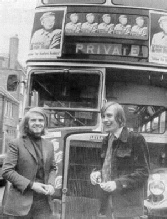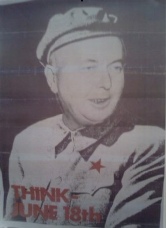© 2014-


RNI - History (2)
Broadcasting of RNI's programmes had continued throughout the voyage from Holland but severe interference was caused to British coastguard communications. Following protests from British authorities RNI ceased transmissions on medium wave on 27th March 1970 for 'frequency adjustments'. Programmes continued on the FM and short wave frequencies for a few days until they too went off the air on 1st April 1970 due to a technical failure.
After ten days silence RNI returned to the air on 10th April 1970 now on 102mHz FM as well as a new medium wave frequency of 1578kHz (190m) with revised programme schedules.
However, the new medium wave frequency caused interference to Norwegian radio stations and also affected the signal of Dutch offshore station Radio Veronica on 192m. In an unprecedented move the British Ministry of Posts and Telecommunications authorised the official jamming of RNI's medium wave signal on 190m on 15th April 1970. At 8.30pm the same evening RNI closed its medium wave transmitter.
Test transmissions on a new wavelength of 217m and also on a new FM frequency of 100mHz started during the evening of 30th April 1970, but once again the Government's jamming signal appeared. The 217m broadcasts were discontinued on 1st May and the medium wave transmitter remained silent for nearly two weeks until 13th May 1970 when test transmissions of RNI's programmes were heard on 244m, adjacent to BBC Radio One on 247m.
When regular programmes started on this new frequency on 16th May 1970 the signal remained clear for five days until once again, on 21st May, the British Government started its jamming signal. This time the action was allegedly being taken at the request of Czechoslovakia, but because of RNI's frequency change the jamming signal itself now caused interference to BBC Radio One transmissions in Kent and Essex. By 28th May RNI was playing a cat and mouse game with the jammers, changing frequency every 15 or 20 minutes between 1227kHz and 1232kHz. However, each time the station changed frequency the jamming signal followed and the attempt to avoid interference to its medium wave transmissions in this way was halted by RNI after only a few hours.
The Labour Government in Britain had called a General Election for 18th June 1970 and on 1st June Edwin Bollier, announced that RNI would close the day after the election if the Labour Party were returned to power. At the same time he also announced the immediate closure of the unsuccessful German Service, which the station had tried to sustain since it came on the air earlier in the year.
June 1970 and on 1st June Edwin Bollier, announced that RNI would close the day after the election if the Labour Party were returned to power. At the same time he also announced the immediate closure of the unsuccessful German Service, which the station had tried to sustain since it came on the air earlier in the year.
Listeners tuning in to RNI's transmissions on 13th June 1970 were surprised to hear the station using the call sign Radio Caroline International. The owners of RNI had come to an agreement with Caroline’s founder, Ronan O'Rahilly, that they would mount an intensive anti-
Key marginal constituencies in London and the south east of England were targeted while a continuous stream of anti-
A campaign bus, with Free Radio slogans and photographs of 'Chairman Wilson' toured marginal constituencies in the south east of England promoting the station and denouncing the fact that the Labour Government had authorised the jamming of its transmissions.
Radio slogans and photographs of 'Chairman Wilson' toured marginal constituencies in the south east of England promoting the station and denouncing the fact that the Labour Government had authorised the jamming of its transmissions.
An important link in rallying supporters during this campaign was the Free Radio Association (FRA), which was still operated by Geoffrey Pearl from Rayleigh in Essex. The FRA provided facilities in the form of telephone numbers and addresses through which listeners could contact the station in response to on air appeals for help distributing campaign leaflets, stickers etc.
On 16th June 1970, just two days before the General Election, Prime Minister Harold Wilson personally authorised the use of the most powerful transmitter in Europe -
Against all opinion poll predictions the Labour Party lost the General Election on 18th June 1970, with many marginal seats in London and the south east being gained by the Conservative Party. Although almost impossible to quantify it is virtually certain, and now generally accepted by political historians, that the campaign mounted by RNI/Caroline during the run up to election day had a significant impact on the result of the 1970 General Election, particularly in those in London and south east marginal constituencies.

Announcing name change to Radio Caroline, 13th June 1970

Statement from RNI management about jamming

Radio Caroline founder, Ronan O’Rahilly with first Caroline DJ, Simon Dee and the Radio Caroline Bus, June 1970

Click on picture to enlarge

Daily Mirror, 16th April 1970

The Sun, 16th April 1970
Test transmission on 217m

‘Free Radio’ promo

Promo for the Conservative Party

RNI (Caroline) news announcing Conservative Party victory

‘Chairman Wilson’ poster
History
Key Dates
Ship and Location
Technical
Staff
Programmes





Treasure Chest



Back to Netherlands/Belgium Gallery





Back to Britain Gallery


Back to RNI
